Every year at this time our team looks forward to reading the thousands of essays submitted as part of our Floret Scholarship application process. This year we received a record-breaking number of applications—6,464 people from 88 different countries applied!
It is such an honor to hear from so many deserving people, from every corner of the globe, who are ready to follow their dreams and fill their lives, and the lives of others, with flowers.
Initially, we had planned on offering 12 scholarships in total. However, after some generous souls came forward, we were ultimately able to increase the number to 17! Each recipient receives free tuition for the 2022 Floret Online Workshop that begins in January.
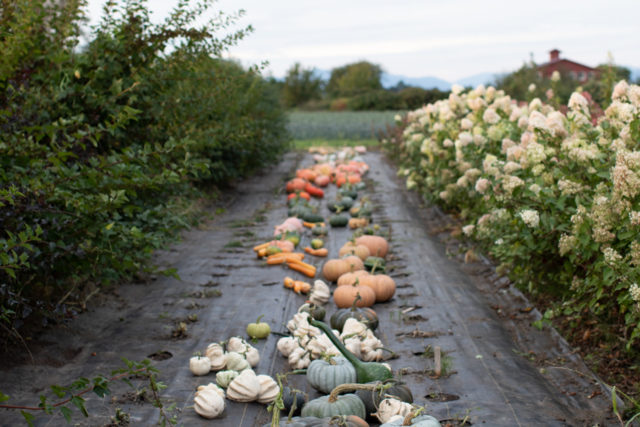 Every year there are some themes that emerge from reading the essays. This year, in particular, giving back was a thread in almost every application.
Every year there are some themes that emerge from reading the essays. This year, in particular, giving back was a thread in almost every application.
More than ever before, people are wanting to create beautiful spaces to share with their community—flower-filled pockets where all types of people can find refuge, comfort, and solace.
“Like many, I have spent the last year reflecting on the impermanence of life, my place in the world, and how I wish to show up. The world can feel so dark, and while there is so much that can be done, what I feel like I can do is share simple but profound wonders like the joy and awe of flowers.”
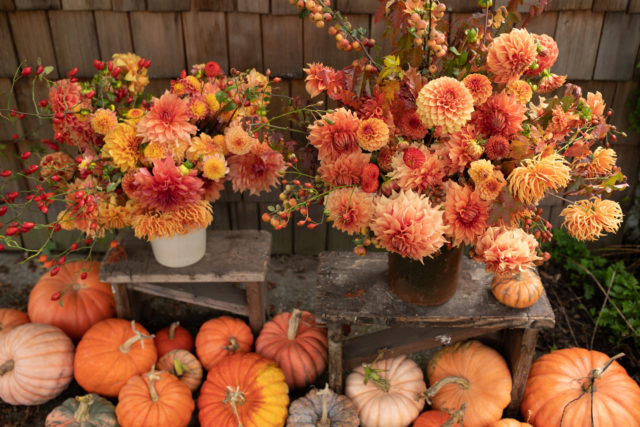 Some applied in hopes of finding like-minded people and others who share their passion and enthusiasm for flowers. In my experience, flower people are some of the kindest and most generous there are.
Some applied in hopes of finding like-minded people and others who share their passion and enthusiasm for flowers. In my experience, flower people are some of the kindest and most generous there are.
“One thing that has drawn me into the flower community is how much everyone shares. They share knowledge, plants, and victories with each other and it inspires this sense of abundance that is contagious. To be a ripple in that pond feels like it starts with this course.”
A huge thank you to everyone who took the time to apply. I am so grateful that you shared your hopes and dreams with the team and me.
I am honored to introduce the 2022 Floret Scholarship winners. Get out the tissues because every one of their stories will leave you in tears.
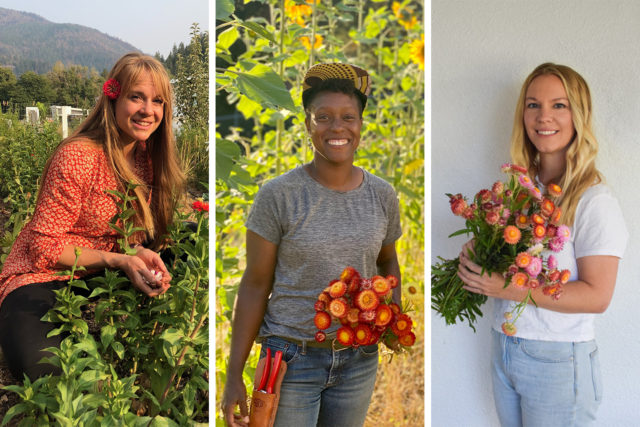
Pictured left to right: Kjesten Essue, Ashlee Johnson-Geisse, and Jenna Hill
Kjesten Essue, Barn Swallow Gardens, Taylorsville, California, United States
Last year Kjesten and her family started Barn Swallow Gardens in Taylorsville, California. She planted over 50 varieties of cut flowers, anticipated every bloom, took notes, and practiced making arrangements while deciding what direction to take her love of flowers. Then her world completely changed in the blink of an eye. “Half the population of our valley lost their homes and a town was wiped off the map by the Dixie Fire. We are all reeling, grieving, and after being home just a week from a seemingly endless evacuation, finding our footing.”
Kjesten is a mother of three small children. Her husband is a special education teacher and school administrator now charged with the task of creating a school for families who have lost everything. She writes, “We need beauty like never before, and I have deep clarity that flowers are the direction I need to take our small farm. Creating beauty is an act of love. Right now the land needs our love and we need to share that beauty with one another. Our community has struggled in general for the past 30 years with the decline of forest management and increasing barriers to small agriculture.”
Kjesten’s hope is that the workshop, along with her experience teaching sustainable agriculture in the Peace Corps, will help her be a force in rebuilding not only her garden but her whole community.
Ashlee Johnson-Geisse, Brown Girl Farms, Hayward, California, United States
Ashlee is the farmer and founder of Brown Girl Farms in Hayward, California. Brown Girl Farms was founded just this past year with the belief that black queer female farmers deserve more representation and celebration in agriculture. It has been such an incredible year of growth for the business. Currently, Ashlee and her team are running a CSA program where members receive a produce box once a week full of delicious produce highlighting African American heritage crops and food traditions. In addition, the farm grows, harvests, and sells flowers to a local black-owned cooperative grocery store called Mandela Grocery in West Oakland.
Ashlee writes, “Our flower bouquets sold through Mandela Grocery cooperative have been a great source of joy for the community and this scholarship would allow us to have access to both farming and business skills necessary to continue to build out our floral side of the farm business and help us create a sustainable business that can thrive and continue to provide for the community. As a black-owned farm, we use our flower bouquets to spread a message of care and love to our community and to symbolize that as black people we deserve beauty, care, and protection; something that we fight for every day in a society that constantly tries to erase us.”
Jenna Hill, Wayward Daisy, Vista, California, United States
This scholarship essay began with “I am applying for a scholarship on behalf of my friend and neighbor, Jenna Hill. Before I ever met her, I noticed her garden. The variety and color were so astonishing that I would slow down every time I drove by, hoping to find out who the mystery gardener was.”
Jenna has made a career out of skills she learned from difficult circumstances. She grew up in a religious organization that separated children from their parents and used them for hard labor. She had been forced to plant fruit trees, dig trenches, and put in irrigation systems, but she turned these terrible experiences, which she documented in a book called Beyond Belief, into something good.
Growing flowers allows Jenna to be with her kids, something she desperately missed growing up. Since delivering to florists required long hours in the car, she reevaluated her business model. She now makes and sells her own arrangements directly to customers through her website, Wayward Daisy, and puts each one in her own beautiful handcrafted ceramic vases.
Her friend writes, “She is unfailingly generous, sharing buckets of dahlias and ranunculus with her neighbors. Her house looks like a florist’s shop, with summer flowers drying from her dining room ceiling, which she plans to turn into fall arrangements. As I stood there looking at them, she asked me, “Do you like lunaria?” I left with an envelope bursting with seeds. At the side of her house, her son was prepping seed trays. My dream would be for this very deserving, hard-working mom to be gifted a scholarship so she can build a sustaining business and bring the joy of her flowers to even more people.”
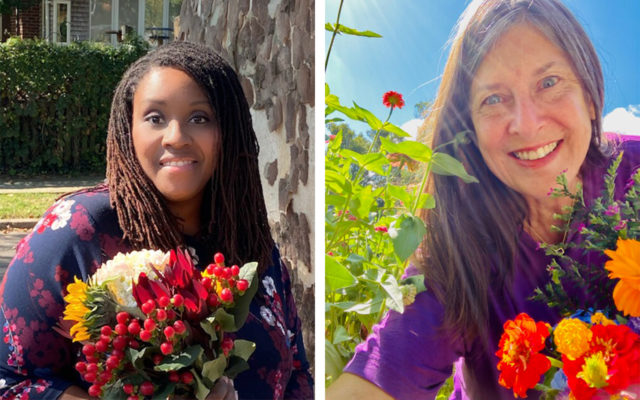
Pictured left to right: Tracy Dove and Heather McGuire
Tracy Dove, Washington D.C., United States
In her hometown of Washington D.C., Tracy is a kindergarten special education teacher and also runs the school garden program. After being on years-long waitlists to get a community garden plot, Tracy found a home with a backyard and can now finally realize her dream of growing flowers on a small scale.
With her small plot, Tracy wants to give back to her community, specifically to other women like herself who have sick children with multiple disabilities. “We are a rare breed. We work night and day to keep a roof over our heads and juggle all the tasks to take care of our children. It is very isolating, overwhelming, and plain hard. It’s my ‘Make-A-Wish’ for moms. Brighten up their day with beautiful flowers. I intend to offer up my cut flower garden as a place families can come with their sick children that is safe and to be one in nature. This is out of reach for our kids that are wheelchair-bound, on oxygen, feeding tubes, etcetera.”
With the workshop, Tracy can plan a year-round garden to engage children with special needs. “My garden will not be a for-profit business. I solely want to create an experience that is out of reach for a specific population that is often forgotten.”
Heather McGuire, Heather Farms Fresh Cut Flowers, Sanford, Florida, United States
Heather has spent most of her life raising her daughter, a genius on the autism spectrum. Her dream was to help get her to college with the social skills necessary to succeed. She achieved her goal and after getting her daughter into school with a full scholarship, embarked on her goal of starting a flower farm. Just two months later, Heather’s husband Bob died suddenly of sepsis and because of the pandemic, they weren’t allowed to be with him in the hospital. Her daughter left college and Heather left her flower farm dream behind.
She writes, “But the garden, the flowers kept their beauty, kept growing and thriving; never giving up. They coaxed us back to life bit by bit. Showed us that life goes on. She went back to college. I went back to our Heather Farms Fresh Cut Flowers dream. Bob is smiling.”
Heather is working to set up Heather Farms as Bob’s legacy. “I want to set up Heather Farms right, as a real business, with a real framework and structure. The way Bob would do it.”
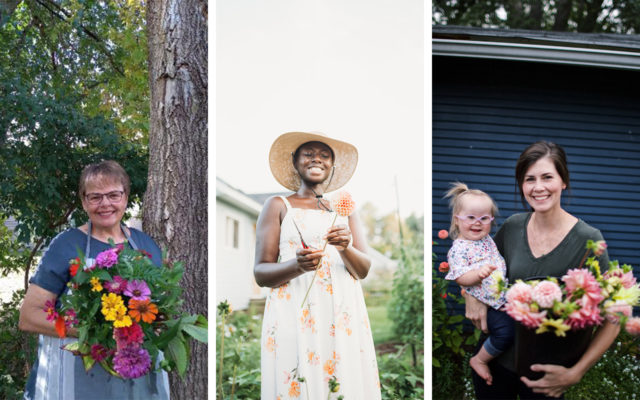
Pictured left to right: Donna Shetler, Akosua Asare, and Danielle Grandholm
Donna Shetler, Platte City, Missouri, United States
Donna is a groundskeeper in the Kansas City, Missouri metro area. In addition to her groundskeeping duties, she works with men who are reentering society from the prison system. For years she has volunteered teaching a simple groundskeeper course in the prison because it is an area of work that is readily available for returning citizens when they are released.
Donna is hoping to start a 1/8-acre cutting garden at one of the properties she maintains. The proceeds from the flower garden will go towards training materials for the in-prison program. In addition, bouquets from the cutting garden will be donated to the Mobile Food Pantry and given away to individuals who receive weekly food deliveries in the most underserved neighborhoods in the Kansas City metro area.
“A key component I weave into the reentry process is to get out, get a job, get stable and give back. It is hard for these returning citizens to give back monetarily. But, to have a part in raising flowers that can be made into bouquets and delivered by the Mobile Food Pantry will give these returning citizens a chance to “give back” with their creativity and hard work.”
Akosua Asare, re.Planted Urban Farm, Deep River, Ontario, Canada
In her small town of Deep River, Ontario, Akosua and her family grow produce and flowers on just over 1,000 square feet split between her and her neighbors’ front yards. She shares, “In that tiny space and in our first year, we’ve managed to gross just under $10,000 CAD, through efficient capital management and creativity—although we’ve yet to make a profit. My husband is the sole breadwinner of our family, and between my and our two children, there is rarely income for extras at the end of the month.”
re.Planted Urban Farm is the only flower farm within a one-hour drive. In the coming season, Akosua and her family will be adding a flower CSA, taking on funeral work, and launching a program to donate bouquets to seniors living alone. It is Akosua’s hope that “each bouquet will bring peace and joy into every heart and home they enter.”
“As a military spouse, I often find myself putting my needs on the backburner for my husband and my children. And so far, I’ve been happy making those sacrifices. However, getting to take the Floret Online Workshop, will be one of the first times I would be able to improve myself and my skills. It would also allow me to build a business that can be a true blessing to our community while supplementing our family income.”
Danielle Grandholm, Rising Kites, Bridgman, Michigan, United States
In April of 2020, at 8 months pregnant, Danielle planted her very first cutting garden. Two weeks later she went into labor and upon her daughter’s birth learned that she had Down syndrome. The birth of Sammie, or “Flower” as her son calls her ultimately changed their lives for the better.
“As a result of her birth and the lack of resources we had been provided with by the hospital she was born in, we set out to start a non-profit called Rising Kites. Rising Kites provides bags of encouragement and education to hospitals, birthing centers, and prenatal clinics that can be immediately distributed to parents who have just learned that their child has a diagnosis of Down syndrome.”
“The cutting garden I planted while pregnant with Sammie has since been a large part of the funding for our family’s non-profit. In our first summer as flower growers, we have taken five 3 foot by 30 foot plots and made around $10,000 via bouquet sales, subscriptions, and workshops which include donations.”
As Rising Kites grows, it is Danielle’s hope that the organization will be able to provide jobs to individuals with disabilities who often have difficulty finding careers.
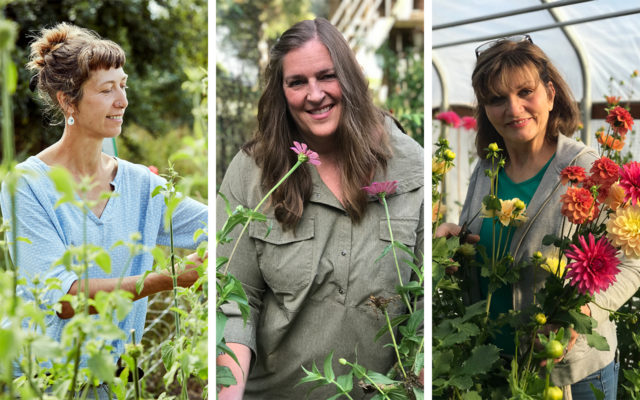
Pictured left to right: Peggy Giertz, Leslie Power, and Paulette LeMieux
Peggy Giertz, Biozuechtergarten, Brandenburg, Germany
Peggy is a biologist and gardener who lives in northeast Germany. She found a little abandoned farmhouse to rent with a decrepit barn and a wild orchard. There Peggy created Biozuechtergarten, a space to focus on seed production, breeding, and experiments with flowers and herbs. She dreams of one day owning her own piece of land.
“This is the dream and here is the reality: In Germany, we now have a fast-growing alliance of sustainable flower farmers and an awakening community of florists that want to make a change. But there are hardly any organically produced seeds for good quality cut flower varieties available. This is a tremendous gap and I’d like to become one filler.”
With the Floret Online Workshop, Peggy hopes to learn how to grow better cut flowers and in turn focus on breeding and seed production to offer to farmers in her region.
Leslie Power, Sundown Ranch, Canton, Texas, United States
For more than 35 years, Sundown Ranch has served adolescents with drug and alcohol addiction. Leslie writes, “The hardest reality of our mission is they eventually leave, often to return but almost always without concrete plans for their future.” Leslie and her team are working on a long-term solution for some of their clients, especially those in the CPS system who have no stable home to return to and few job skills. This solution depends on the creation of a cutting garden for growing and selling to retail florists, local farmers markets, and a u-pick flower stand.
“I remember my first vegetable garden, and how armyworms destroyed my harvest. My onions were planted too deep and my soil was too sandy. All of the solutions to these problems came from kind neighbors who had gone before and were willing to share their knowledge with me! How grateful I am for a helping hand! The Floret Workshop offers a blueprint for starting a flower business that would take years to get right without a guide. This workshop would help us get closer to providing a home and a vocation to young women who need a helping hand.”
Paulette LeMieux, Idaho Falls, Idaho, United States
Paulette and her family moved to Idaho Falls where they found a 5-acre property and a close-knit community with resources for their granddaughter Bella who had come to live with them. Bella does not recognize social cues and has a hard time communicating. Paulette was about to put her vegetable farm on the backburner when she realized that Bella was coming alive in the garden. Paulette found that Bella communicates best while parallel playing and while working side by side with her in the garden, where she could listen, answer, and chatter away.
“I am applying at the last minute because I realized I have the best therapy forum right here behind my house. I need the income from the farm. I need Bella and many like her to have a lovely, nurturing, therapeutic place to communicate and socialize while engaged in worthwhile work.”
With the workshop scholarship, Paulette will be able to incorporate the income from cut flowers into her vegetable operation along with efficient systems. She hopes to start a series of workshops where people can communicate through flowers and help others like her granddaughter.
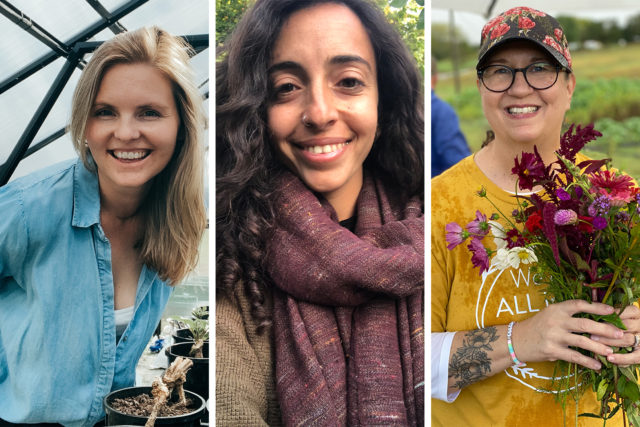
Pictured left to right: Teigan Priest, Sandra Gouel, and Becky Shaffer
Teigan Priest, Twyllo Flower Farm, Canberra, Australia
Teigan’s mother Michelle submitted a scholarship application on her daughter’s behalf. She described that every waking minute, when Teigan is not caring for her two young children, Michelle finds her out in the “Flower Paddock” sowing seeds, tubers, weeding, watering, and planting.
Their small rural community in Australia has been greatly impacted by bushfires and Teigan has started a small flower farm, Twyllo Flower Farm, to help bring the community together and to provide locals with job opportunities. Teigan has received so much support from the local village because of what it could mean for everyone involved.
“Currently florists and restaurants in our area have to take a 3.5-hour drive to the Sydney flower markets to source their flowers, so the need for locally grown is in high demand. Most of the flowers purchased at the markets are grown overseas so from an environmentally conscious business approach growing and producing locally is of the utmost importance.”
Sandra Gouel, Firelight Farm, Lytton, British Columbia, Canada
Five years ago Sandra left the big city and moved to raw, rugged land in Lytton, British Columbia. She took on some gardening jobs while simultaneously working on her own space. She invested in a greenhouse and dialed in her systems, hoping to have an upcoming season at the local farmers market. And then the wildfires came, burning everything to the ground.
“I narrowly escaped but lost everything, my home, my cats, the whole town, and the life I’d been living. But this is not a sob story about loss—this is to tell you that the first thing I did was re-run irrigation lines and get water to my garden and the trees around it. Everything is gone, but 75% of my garden survived and is thriving. Sitting in my wet colorful garden surrounded by scorched earth filled me with tears and awe. Amid destruction, life is resilient.”
This experience has been the catalyst for Sandra to look at her life through a different lens. “The fire has taught me where my priorities lie—in growing, in nurturing, and in spreading the magic of resilience that my garden has shown me to others. I hope to bounce back better and stronger, and the Floret Online Workshop will help me do so.”
Becky Shaffer, Saving Grace NWA, Rogers, Arkansas, United States
Saving Grace is an organization that serves girls, ages 18 to 25, who have aged out of the foster care system or are homeless in the Northwest Arkansas area. Becky Shaffer grew up in the foster care system and struggled in early adulthood. She realized that she could have an impact on others with a similar experience with the help of her community.
“We opened our doors in 2010 and can serve 12 in the live-in space we lease. Recently we purchased 50 acres to expand to serve many more girls, as we receive over 130 applications a year. We are excited to add many new opportunities to our program and one of those is a flower farm. We believe good experiences heal bad experiences and want to give these young women every opportunity to break the cycle of poverty for generations to come!”
The workshop will help Becky and her team start off on the right foot with their new flower farming endeavor. “We believe in operating within a place of excellence, not perfection and (again) learning by doing is so important to us, but going into the growing season empowered with some knowledge would give an opportunity to bring these girls alongside us much sooner than we ever could on our own. As the beautiful African proverb says, ‘If you want to go fast, go alone. If you want to go far, go together.’”
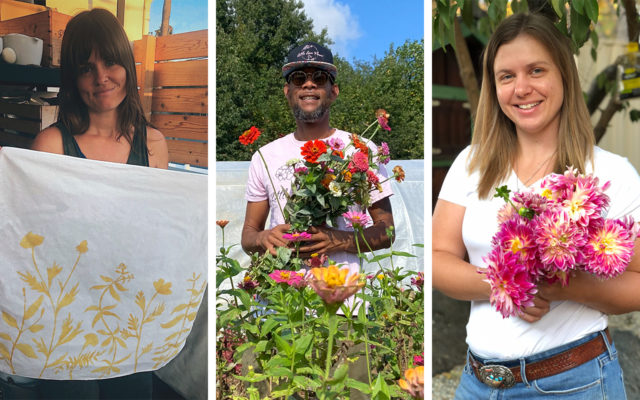
Pictured left to right: Liz Spencer, Edward Hickerson, and Christina Wickeraad
Liz Spencer, The Dogwood Dyer, Oceanside, California, United States
Liz Spencer is an artist, gardener, mother, and owner of The Dogwood Dyer. When she was traveling abroad she helped a community create a dye garden and the experience completely changed her life. For the past 10 years, she has focused on natural dyeing and transforming textiles with color from plants.
She now focuses on educating others about natural dye plants and how to lessen the environmental impact in the process. Liz creates natural dye kits and is currently supporting a family-run farm growing marigolds for her. Now 5% of the profits from all of her kits go to Dixza Rugs & Organic Farm—a traditional Zapotec family of weavers and dyers whose descendants have worked with marigold flowers for centuries.
With the help of the workshop, Liz will work to expand her garden with drought-tolerant, native species dye plants and to be able to teach others the art of natural dyes that don’t have a detrimental effect on the environment.
Edward Hickerson, Little Love Flower Co. and Hickerson Veggies, Henderson, Kentucky, United States
Three years ago Edward started tending vegetables in his backyard out of a 20 by 36 foot bed and then started Hickerson Veggies. From that experience, he developed a love and passion for growing things. After reading Cut Flower Garden, Edward planted flowers for the very first time. “I fell in love with everything flowers have to offer and truly felt like my dream for once would become a reality and I had found the missing link in my life. After serving three tours in Iraq, flowers have become my refuge in the fight against PTSD.”
Edward is the only minority and first-generation farmer in his small town in Henderson County, Kentucky. Flowers have helped him grow, heal, and become a better person. The Floret workshop will help Edward realize his dream of being the best flower farmer in the state of Kentucky.
Christina Wickeraad, Toppick Flowers, Auburn, California, United States
Christina has had a very diverse life path, working in areas from taxidermy to veterinary care to logging, but a constant in her life has been getting outside in the garden. She eventually found her way to cut flowers and fell in love seeing the joy on people’s faces when given a bouquet of flowers grown in her backyard. This passion has now turned into a business, Toppick Flowers, and a deep commitment to sharing with others.
“To me, Floret is finding your passion and passing it along. An amazing man recently told me that, “knowledge is useless unless it is shared.” I truly admire the sharing happening in your business and strive to do the same.”
In addition to growing her own business, Christina volunteers at a horse rescue that has just started a cut flower garden in order to donate bouquets to hospitals and nursing homes. She writes, “With this workshop opportunity, my tenacious work ethic and desire to learn will go the distance for both myself and my community.”
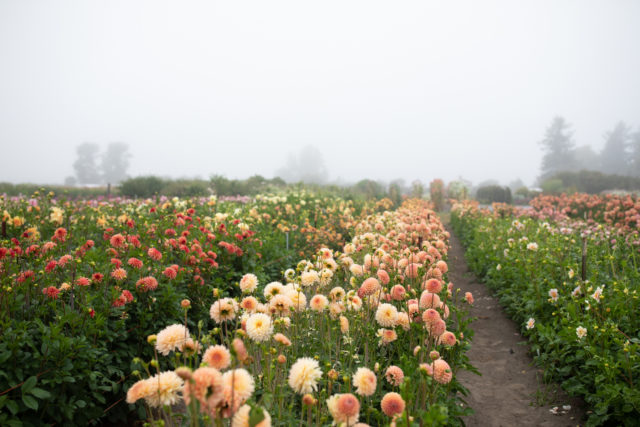 Reading the winners’ shocked and grateful responses has been such a thrill. What is especially meaningful is that many have committed to also pay it forward and give back to their communities in some way. My dream is for this spirit of giving to continue to grow and bring even more beauty into the world.
Reading the winners’ shocked and grateful responses has been such a thrill. What is especially meaningful is that many have committed to also pay it forward and give back to their communities in some way. My dream is for this spirit of giving to continue to grow and bring even more beauty into the world.
If you’re interested in helping these deserving people and causes even further, please let us know. Email [email protected].
Please join me in congratulating the 2022 Floret Scholarship winners by leaving a comment below. All of us here at Floret are so thrilled to have this group join us for the upcoming Floret Online Workshop.
If you’d like to learn more about the Floret Online Workshop be sure to visit our workshop page and sign up for our waitlist to stay in the loop.

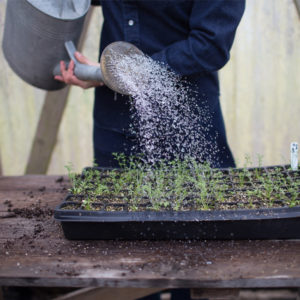
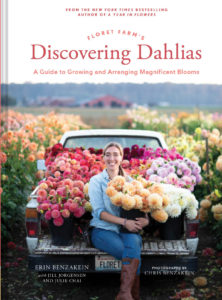
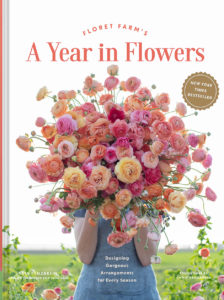
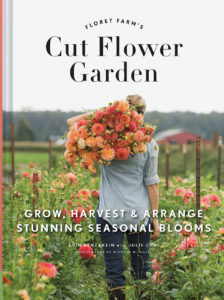

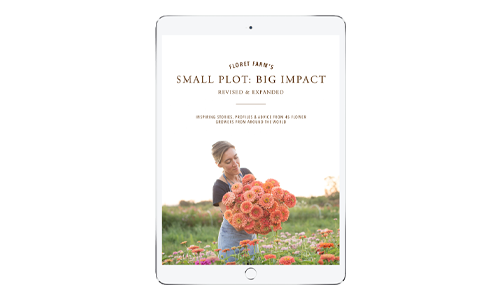
Tracy on
Congratulations to everyone!
All of your personal stories are so heart felt and inspiring.🌸🌸🌸🌸